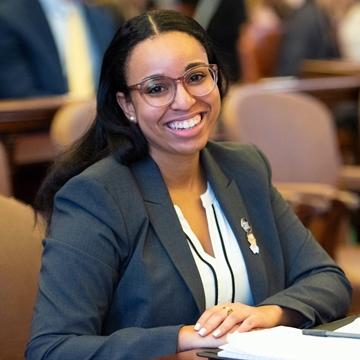Leading With Equity

Amanda Nagim-Williams, RWU Law Class of 2021
Juris DoctorWhen she graduates this May, 3L Amanda Nagim-Williams will set her career in motion with a powerful start – clerking for history-making New Jersey Superior Court Judge Sheila A. Venable, who was appointed earlier this year as the first Black assignment judge for that state’s Essex County Vicinage.
“This is something I really wanted to do, and it speaks about working with intention,” Nagim-Williams said. “I told myself that if I was going to clerk, this is the experience I was looking for – and somehow the stars aligned!”
Not that she left matters to chance. Over the past year, Nagim-Williams completed a summer internship with the Youth Advocacy Division of the Committee for Public Counsel Services’ (CPCS) Juvenile Defender Dismantling Racism Subcommittee, which she followed up last fall with an internship at the Middlesex County District Attorney’s office.
The experiences helped instill a fledgling sense of affinity with Justice Venable
“She had a similar trajectory to my own, in that she also has a background in both prosecution and defense work, and she cares deeply about equity and inclusion,” Nagim-Williams explained.
Nagim-Williams’ internships, spanning both sides of the criminal justice system, evoked a similar set of concerns.
“My experience with the district attorney’s office gave me an opportunity to see exactly where I needed to fit in,” she said. “By contrast, I felt that prosecutors – particularly prosecutors of color; and then, to add even more of a dynamic to that, Black women who become prosecutors – have a lot of different things working against them. It is hard to work within a system that desperately needs change, when history says there is no place for you on this side of the justice system because of your racial and gender identities.”
From both perspectives, the issue of equity looms large.
“I got a chance to see what equity looks like in the justice system,” she said, “and that is what’s important to me. Given the way the criminal justice system is currently set up, a lot of the power resides with the prosecutor. I am focused on making equitable change and one day having an opportunity to make a larger-scale impact.”
Though Nagim-Williams’ internships took place online due to the pandemic, she said they were still compelling and intense.
“Covid-19 impacted everyone’s plans differently,” she said, speaking of her externship with the DA. “Despite being completely remote, it was a rewarding experience. I was a part of team meetings, stood on the record as an assistant district attorney for the Commonwealth, and had the opportunity to do a lot of things I probably couldn’t have done if I’d been there in person.”
Mona Igram, Nagim-Williams’s supervisor at the CPCS, said the Middlesex DA’s office was “very lucky to bring Amanda on board. We are very supportive of her goals and dreams, and we know that her commitment to racial justice will make her a wonderful advocate for justice in any field she chooses.”
Seeking Racial Justice
Nagim-Williams’ time at RWU Law provided her with further opportunities to explore “the intersectionality between the law and race – or particularly, racial justice.” For example, she has served as an e-board member on the Black Law Students Association, chair of the Honor Board, and student co-chair of the Curriculum, Training, and Programming Subcommittee of the Diversity and Inclusion Steering Committee. Academic work has been useful as well. For example, “my Critical Race Theory course really helped me find tangible places in the law and in our history through which I can help make the world a little bit better,” she said.
All of which has confirmed her original instinct in choosing RWU Law over other institutions around the country which she had also considered. A Boston native, Nagim-Williams said Roger Williams struck her as an institution that reflected her commitment to and passion for racial equity in the justice system.
“I saw students involved in work I could see myself doing,” she said. “I really appreciated their commitment to doing the work and I appreciated that there was a space for that – a willingness to push the envelope and change things, which isn’t something you’ll necessarily find at another law school.”
Its status as Rhode Island’s only law school also factored into her decision.
“That uniquely positions RWU Law to be a trendsetter in a number of ways,” she said. “It helps to build connections with the legal community within Rhode Island, and that was very attractive.”
Because at the end of the day, it’s all about the work.
“I will always use my platform of privilege – whatever that looks like – to seek equity in the legal field,” Nagim-Williams affirmed. “That starts with being accountable, and being brave when encountering really uncomfortable situations. It comes from having principles that won’t waver irrespective of your title or what side of the criminal justice system you’re on. No matter where I go, I know I can say this: I will always lead with equity.”
